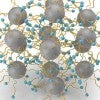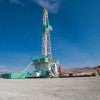
New Houston innovation district to foster climate tech startups
The Ion, the centerpiece of a Houston innovation district developed by Rice University, has a new neighbor: Greentown Labs, a community of startups taking on climate change.

New Houston innovation district to foster climate tech startups
The Ion, the centerpiece of a Houston innovation district developed by Rice University, has a new neighbor: Greentown Labs, a community of startups taking on climate change.

Fungi embrace fundamental economic theory as they engage in trading
HOUSTON – (June 29, 2021) – When you think about trade and market relationships, you might think about brokers yelling at each other on the floor of a stock exchange on Wall Street. But it seems one of the basic functions of a free market is quietly practiced by fungi.

Quantum dots keep atoms spaced to boost catalysis
Rice engineers use graphene quantum dots to trap transition metals for high atom loading in single atom catalysis.

Solar energy collectors grown from seeds
Rice University engineers have created microscopic seeds for growing remarkably uniform 2D perovskite crystals that are both stable and highly efficient at harvesting electricity from sunlight.

Seismic study will help keep carbon underground
A Department of Energy grant to Rice geoscientists enables development of fiber-optic sensors to find and evaluate small faults at underground carbon dioxide storage reservoirs.

Houston is ready for the green energy transition, says Baker Institute expert
Houston’s “energy capital of the world” status is here to stay — no matter the type of energy — according to a new report from Rice’s Baker Institute for Public Policy.

Molecular jiggling has implications for carbon nanotube fibers
New research suggests the jiggling motion of carbon nanotubes suspended in liquid solutions could have implications for the structure, processing and properties of nanotube fibers formed from those solutions.

Pedram Hassanzadeh wins NSF CAREER Award
Atmospheric blocking is known to cause or exacerbate extreme weather events, but much about them remains a mystery. Rice University fluid dynamicist Pedram Hassanzadeh has won a prestigious National Science Foundation CAREER Award to study these events with an eye toward better understanding the physics behind their complex mechanics.

Houston flooding polluted reefs more than 100 miles offshore
Flower Garden Banks fouled by runoff from 2017's Harvey and 2016's Tax Day floods, Rice research finds.

Tires turned into graphene that makes stronger concrete
Rice scientists optimize a process to turn rubber from discarded tires into soluble graphene.

Corals may need their predators' poop
Fish that dine on corals may pay it forward with poop. Rice University marine biologists found high concentrations of living symbiotic algae in the feces of coral predators on reefs in Mo'orea, French Polynesia.

Rice study to examine how ice melt in one area impacts sea level rise in another
How does ice melted by climate change in Greenland hit the shores of Honolulu?

Seven research teams win Carbon Hub funding
Carbon Hub, Rice University's zero-emissions research initiative, has awarded seed grants for seven projects that will rapidly advance its vision for transforming the oil and gas sector into a leading provider of both clean hydrogen energy and solid carbon products that can be used in place of materials with large carbon footprints.

Rice team forges path toward geothermal future
Rice scientists have joined a federal project to accelerate breakthroughs in geothermal systems for unlimited, inexpensive energy.

Research could dramatically lower cost of electron sources
Rice University engineers have discovered technology that could slash the cost of semiconductor electron sources, key components in devices ranging from night-vision goggles and low-light cameras to electron microscopes and particle accelerators.